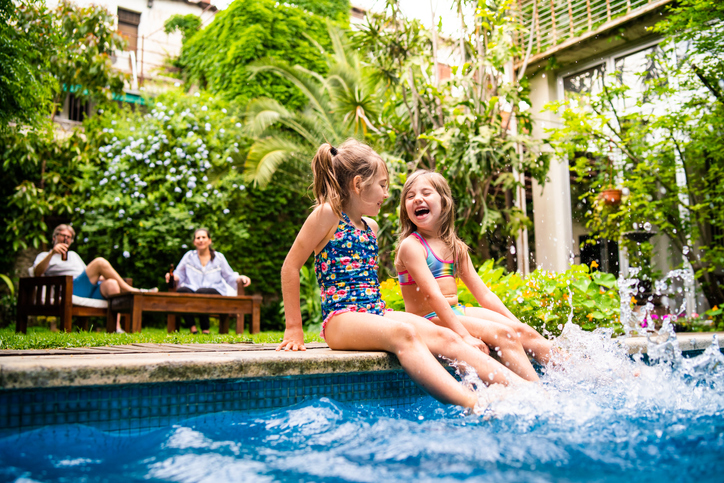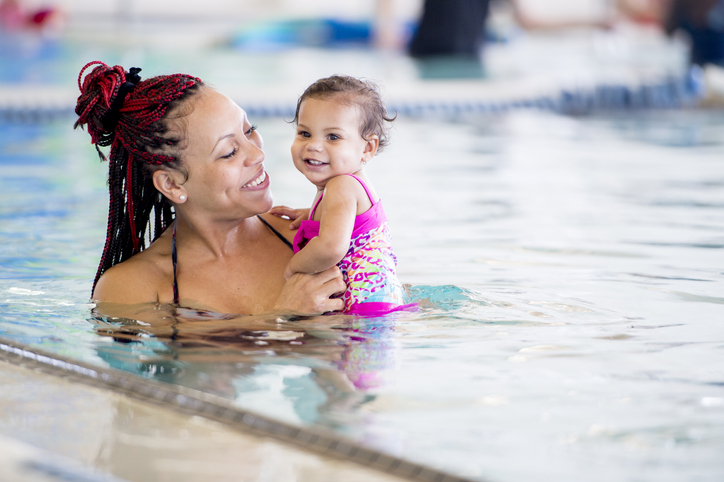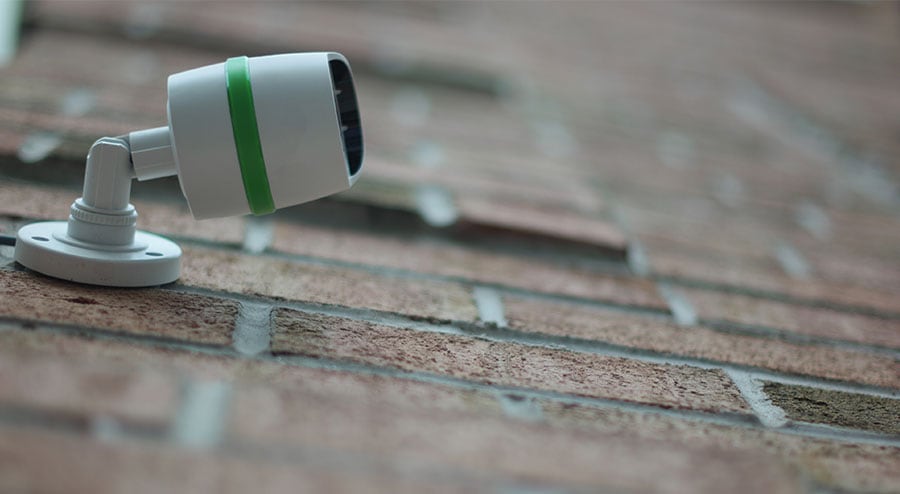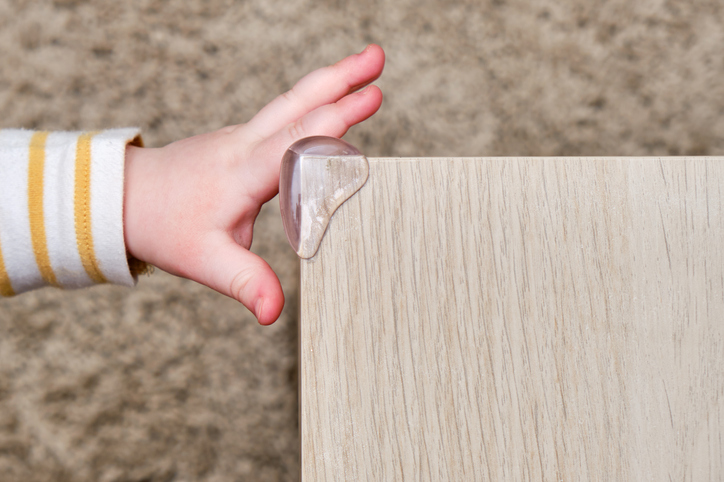Having a pool at home can be fun for entertainment, physical fitness, and to beat the heat during the warmer months. However, there are numerous safety concerns that every pool owner must address to ensure a safe experience for all.

The most common risks associated with home pools are drowning, slip and fall accidents, and chemical exposure. Drowning is a significant hazard, especially for young children and non-swimmers. Similarly, the area surrounding the pool can often become wet and slippery, resulting in falls that can lead to injuries. Lastly, improperly handled or stored pool chemicals can cause burns, respiratory issues, and other health complications. Hence these risks must be understood to create a safe pool environment.
The Basics of Home Pool Safety
No matter the swimming capabilities of those in the pool, an adult should always be present to supervise, especially when children are involved. Lifesaving experts like the American Red Cross suggest designating a ‘Water Watcher,’ an adult who takes responsibility for overseeing the safety of swimmers without any distractions.
Children should be taught about pool safety which includes instructing them to never swim alone, to stay away from pool drains, and to avoid running or pushing others around the pool. Several organizations, like the National Drowning Prevention Alliance, provide detailed pool safety guidelines and educational resources designed specifically for children.
Everyone who uses the pool should at least understand basic swimming skills such as knowing how to float, tread water, and safely exit the pool. Many companies like the YMCA offer swim classes for all ages and skill levels. Even non-swimmers can enjoy the pool under safe conditions, such as using life vests or floatation devices. Companies like Stearns and Speedo offer a variety of Coast Guard-approved life jackets and flotation aids suitable for pool use.
Lastly, having appropriate lifeguarding equipment near the pool is important in creating a safe environment. Equipment like the Lifebuoy Pool Alarm system can alert you when someone unexpectedly enters the pool. Traditional safety tools like a Life Ring, or ‘Shepherd’s Hook’ from brands like Poolmaster, are also vital. Having a readily available First Aid Kit, like the “Swimline Poolside First Aid Kit”, can also be a lifesaver during emergencies. While the cost of these products can vary, typically one can expect to spend between $50 to $200 for a good quality, comprehensive set of pool safety equipment.
Safeguarding Your Pool Environment
A pool fence is very effective in safeguarding your home pool environment. Brands such as Life Saver and GLI offer pool fencing options that meet the safety standards of the Consumer Product Safety Commission (CPSC), typically ranging from $200 to $1500 depending on pool size and fence materials. Pool fences not only limit uncontrolled access to the pool, especially by young children or pets, but also provide a visual cue of the pool’s boundary, thereby reducing accidental falls into the pool.
Reducing slip and fall accidents can be done by ensuring the pool deck is made of non-slip materials. Pool deck coatings, like the In The Swim Patio and Deck Paint, provide a textured surface that increases traction and costs about $50-$100 for a typical home pool. In addition, pool rules should stipulate no running or rough play in the pool area.
Pool covers, such as those by the company Pool Safety Cover can prevent accidental submersion and also keep your pool clean, though they should always be fully removed before swimming. They range from a few hundred to a few thousand dollars, depending on pool size and cover type.
When installing a new pool, consider safety features at the outset including aspects like a non-slip deck, handrails for easy entry and exit, and appropriate lighting for nighttime swimming. Pool lights should be specially designed for pool use, like the Pentair 601101 IntelliBrite, which is a safe, LED pool light costing about $500.
Remember that water and electricity do not mix and all electrical appliances, such as sound systems or outdoor fridges, should be kept at least 6 feet away from the pool, and all pool electrical systems should be installed and regularly checked by a licensed electrician to ensure they meet the local codes and safety standards.
Maintaining a Safe and Healthy Pool
Water clarity and regular pool maintenance includes skimming off debris and cleaning out filters, to prevent the buildup of harmful bacteria and algae. Automated pool cleaners, such as the Dolphin Nautilus CC Plus Robotic Pool Cleaner priced at around $800, can assist in this process, keeping the pool clean with minimal effort.
Chemical levels are another aspect of pool maintenance and include the pH, chlorine, and alkalinity levels. Checked these levels regularly to maintain a safe and comfortable swimming environment. Brands like Poolmaster offer 7-way pool water test kits for around $20, enabling homeowners to monitor these levels easily. If you prefer a tech-forward approach, you may consider digital pool water testers, such as the LaMotte WaterLink Spin Touch, although these can range up to a few hundred dollars.
The safe operation of pool equipment, including pumps, heaters, and filters, can be achieved via regular inspection of these elements which helps prevent unexpected malfunctions or accidents. For example, a broken filter could lead to a pool filled with contaminants, while a faulty heater might pose burn risks. The cost of these maintenance checks can vary, but you can expect to spend about $75-$100 per hour on a professional pool maintenance service.
Lastly, storing pool chemicals correctly must be done to prevent harmful fumes or potential chemical burns. Store chemicals in a cool, dry place, out of reach of children and pets. A lockable storage cabinet like the Suncast BMC3000 Cabinet-Resin Construction for Wall Mounted Garage Storage, costing around $100, could be an excellent option for safely storing pool chemicals. Proper storage not only prolongs the life of these chemicals but also ensures the safety of your household.
Preparing for Emergencies and Special Situations
A well-stocked first aid kit near your pool area should include essentials such as bandages, antiseptic wipes, tweezers, a CPR mask, and a thermal blanket. Brands like “Swimline” and “PhysiciansCare” offer specially curated pool first aid kits that meet these needs, with prices ranging from $20 to $50.
Act quickly and calmly in the event of a pool-related emergency. If someone is in trouble in the water, get them to safety if possible, then immediately call 911. After the person is safe and help is on the way, you can provide first aid or CPR if trained to do so. Regular CPR and first aid training from organizations like the American Red Cross are invaluable for any pool owner.
Special precautions should be taken if pets have access to the pool area as not all pets are natural swimmers and even those that are can get into trouble. Consider a pet safety ramp such as the Skamper Ramp, which allows pets to get out of the pool if they accidentally fall in, with prices starting at around $50.
Ensuring that home pools are accessible and safe for people with disabilities or special needs is important in preventing accidents. Pool lifts, like the S.R. Smith Multilift, which costs approximately $4,500, enable safe pool access for individuals with mobility limitations. If someone has a visual impairment, using tactile and audio cues around the pool can help them navigate safely. Similarly, flotation devices designed for individuals with special needs, such as the Water Gear Water Cell Flotation Collar, can provide additional safety during swimming. The cost for these devices typically ranges from $50 to $200. Always consult with an occupational or physical therapist for personalized recommendations based on the individual’s specific needs.
Exploring Specifics for Different Pool Types
In-ground and above-ground pools have different safety considerations. For in-ground pools, ensuring that the pool is clearly marked and fenced in, including locking gates, is critical. Using pool alarms, like the Lifebuoy Pool Alarm system, can provide an extra layer of security. On the other hand, above-ground pools pose a risk of collapse or failure if not properly installed and maintained. Consider sturdy options like the Intex Ultra XTR Pool Set, priced around $1,000, which features a robust, galvanized steel frame.
The recommended safe depth for home pools often depends on the users. For families with young children, a maximum depth of 1.2 meters (or around 4 feet) for at least one part of the pool is suggested, enabling children to touch the bottom comfortably. Deeper pools may be suitable for homes with more proficient swimmers, but it’s advisable to have a gradually increasing depth and clear markings to indicate deep ends.
When heating your home pool, the recommended temperature is generally between 78 and 82 degrees Fahrenheit (25.5 – 27.7 degrees Celsius) for recreational swimming. If you use a gas or electric heater, like the Hayward W3H150FDN Universal H-Series, priced around $1,700, ensure it is regularly serviced and correctly installed to avoid any safety hazards. Solar heaters, such as the SunHeater S120U Universal Solar Pool Heater priced at about $200, can be a more environmentally friendly and cost-effective option for maintaining your pool’s temperature.
Final Thoughts
Home pool safety is a continuous commitment encompassing diverse aspects, such as fundamental precautions, physical measures, regular maintenance, and preparedness for emergencies. Tailoring safety measures to different pools and users enhances the secure swimming environment. However, these are not a one-time implementation. Regular updates, maintenance, and re-education are vital to ensure the effectiveness of these safety protocols, reflecting the evolving nature of safety with time, technology, and our understanding of risks.




